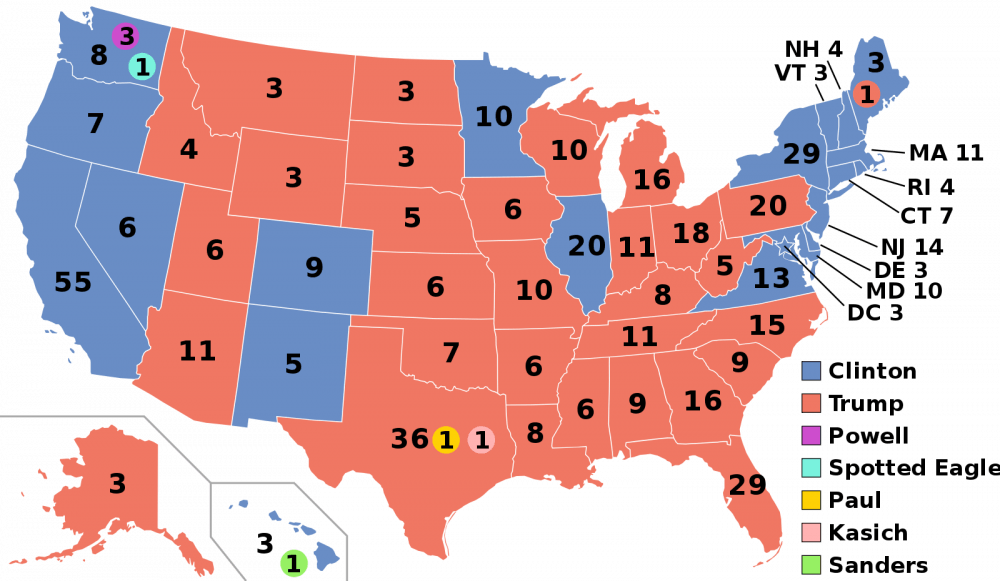In contrast to 10 years ago, you don’t need to search long in order to find a parade of college students, politicians, academics and entertainers all calling to abolish the Electoral College. Among them, per usual, Rep. Alexandria Ocasio-Cortez’s (D-N.Y.) voice rings loudly — indicting the institution for its supposed repression of racial minority voters. But a surprising number of less radical Democratic politicians have decided to join Cortez. Most notably, Presidential candidates Sen. Elizabeth Warren (D-Mass.), Beto O’Rourke, Julián Castro, Sen. Cory Booker (D-N.J.), Mayor Pete Buttigieg and Sen. Kirsten Gillibrand (D-N.Y.) have all spoken out in support of eliminating the Electoral College in favor of a nationwide popular vote.
Locally, look no further than the University’s 2019 Valediction, in which music producer Pharrell Williams asked the graduating audience members and their families, “In 2019, what’s the real role of the Electoral College if not a tool of oppression?” In actuality, however, the Electoral College was a highly contested attempt by the U.S. founders to prevent the tyranny of mob rule and preserve the doctrines of federalism — and it continues to serve that purpose.
So why have progressives just latched on to the idea that the aging institution is actually a methodical plot to ensure the domination of cultural conservatives and wealthy elites? Naturally, protests arose in conjunction with the collapse of the “Blue Wall” — a collection of states that once solidified the Democratic presidential candidate’s command over the Electoral College. The righteousness, fairness and virtue of the Electoral College lay contingent on a blue victory. When President Donald Trump picked up the “Blue Wall” electors from Pennsylvania, Michigan, Wisconsin and even one from Maine — the process was inevitably deemed bogus.
Unfortunately, progressive demands to eliminate the Electoral College are just one of the many ways in which liberals are attempting to move the pendulum back in their direction. Lowering the voting age to 16, packing the court and eradicating voter ID are other examples.
Demands to dismantle the Electoral College ultimately reveal how dishearteningly shortsighted American politics has become. As soon as an institution fails to benefit particular partisan interests, people discredit its original intent. This dangerous mode of thinking can be summed up in the Chesterton’s Fence parable, an excerpt from G. K. Chesterton's 1929 book “The Thing”:
“In the matter of reforming things, as distinct from deforming them, there is one plain and simple principle; a principle which will probably be called a paradox. There exists in such a case a certain institution or law; let us say, for the sake of simplicity, a fence or gate erected across a road. The more modern type of reformer goes gaily up to it and says, “I don’t see the use of this; let us clear it away.” To which the more intelligent type of reformer will do well to answer: “If you don’t see the use of it, I certainly won’t let you clear it away. Go away and think. Then, when you can come back and tell me that you do see the use of it, I may allow you to destroy it.”
Heeding Chesterton’s warning, let’s take a closer look at the foundational principles enveloped by the Electoral College before we seek to eradicate it. “Federalist Paper no. 68” shows us that above all, the founders sought to counter the threat of mob rule. Nearing the end of the 18th century, rule by the masses equated to rule by large, slaveholding states like Virginia. The Electoral College upheld the principles of federalism and sovereignty during a period of United States history in which unification was a choice, and the diverse interests of each state served as a potential impediment to an independent nation. While Alexander Hamilton recognized the massive power bestowed upon the U.S. president, he actively involved individual states in the election process to ensure the executive acted on their behalf. In the context of our rapidly dissolving federalist system, the Electoral College is imperative now more than ever.
To bypass the system without amending the Constitution, several states are signing into law the Popular Vote Interstate Compact. The bill, which stipulates an agreement among various states to allocate their votes to the winner of the national popular vote, overrides the Electoral College by forcing the hand of the participant states’ electors. Last May, Nevada Democratic Gov. Steve Sisolak issued a formal veto of the bill, explaining in a tweet, “Once effective, the National Popular Vote Interstate Compact could diminish the role of smaller states like Nevada in national electoral contests and force Nevada’s electors to side with whoever wins the nationwide popular vote, rather than the candidate Nevadans choose.” The implication is clear — the will of more populous states often conflicts with the best interest of mid-sized and small states.
The Electoral College establishes a system in which, by necessity, presidential candidates must campaign and appeal to a broad array of voters to win the office. At its core, the institution ensures that no state is left behind. In a large, diverse country seeing more and more authority hoarded by a powerful national government — the dispersal of power among states serves to protect our federal system.
Charlotte Lawson is an Opinion Columnist for The Cavalier Daily. She can be reached at opinion@cavalierdaily.com.







